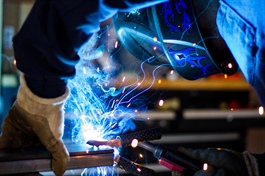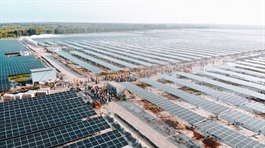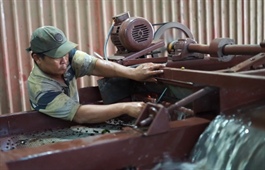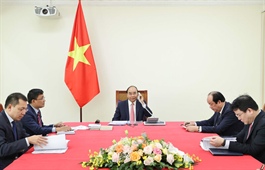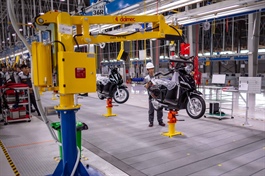Smart factories are the future of manufacturing enterprises
Smart factories are the future of manufacturing enterprises
Entering the digital age, businesses and manufacturers must adapt to and lead the “new normal”. Yoon Young Kim, country president of Schneider Electric Vietnam and Cambodia, shared with VIR’s Huong Thuy his perspectives on Schneider Electric Vietnam’s strategies as well as how Vietnamese enterprises can utilise digital transformation at manufacturing factories.
Where do you think the Vietnamese economy stands at the moment?

Yoon Young Kim, country president of Schneider Electric Vietnam and Cambodia
|
Looking at Vietnam’s economic indicators, I am pretty optimistic. The manufacturing sector shows good signs of recovery and growth. Although Vietnam has just witnessed the second wave of COVID-19 pandemic in August and suffered economic losses from natural disasters, both industrial production and retail sales increased more than 6.5 per cent compared to the same period last year.
In the long term, Vietnam is looking at stable growth as one of the few countries that are expected to see positive growth in 2020, which will accelerate in the next period. According to the Asian Development Outlook (ADO) 2020 Update of the Asian Development Bank (ADB) released on September 15, Vietnam’s GDP is projected to expand by 1.8 per cent in 2020 and increase at the rate of 6.3 per cent in 2021, whereas the GDP of developing countries in Asia will decline by 0.7 per cent in 2020 and grow by 6.8 per cent in 2021.
This "miraculous" development, in my opinion, comes from many favourable conditions, including the “right time, right place, and the right people”. First, Vietnam’s investment environment is supported by political stability, social security, and high economic growth which is projected to be positive even during the pandemic.
Also, the country’s infrastructure readiness has been improved largely such as the expansion of industrial zones as well as the occupancy rate that gives investors more options for their strategic operation in the country.
Finally, Vietnam’s young and vibrant workforce that can learn fast has been able to upskill via investments to be involved in the global supply chain and industrial technology.
Another noticeable point is that the landmark EU-Vietnam Free Trade Agreement (EVFTA) has just come into effect. It has great strategic significance by facilitating businesses to join the market as well as accelerating innovation and reform to be ready for the “new normal”.
How can Vietnamese enterprises create a game-changing situation? How should they navigate the current unpredictable business environment?
The essential thing for every business is the spirit of creativity, innovation, the daring to experiment, adaptability, and flexible transformation to adapt to their internal and external environment.
Digging deeper into the manufacturing industry, external factors such as the pandemic and the EVFTA reinforce the agility, efficiency, and resiliency by accelerating digital transformation in business structure.
At Schneider Electric, we focus deeply on digital transformation and highlight the four most prominent trends: the transition to remote technology; Resilience – the industry needs to focus on connectivity, predictiveness and preventiveness across the whole chain, automation and analytics need to be implemented; efficiency acceleration by the integration of energy and automation, the vertical integration of end-point to cloud and the lifecycle integration; and sustainability as a priority.
Based on Schneider Electric's experience, can you analyse the advantages of integrating deep tech and digital transformation into operating and manufacturing processes?
Digital transformation has become one of the ultimate goals of every business in the digital age. In the manufacturing industry, “smart factory” is now a familiar concept. In fact, smart factories have been developed rapidly, especially in highly competitive markets and industries. Another term, which is called “dark factory”, has also emerged globally. Dark factory is a smart factory that is able to automatically produce and operate all the time. The “dark” means manufacturing still functions continuously and intelligently without human intervention.
Schneider Electric has developed a comprehensive solution called EcoStruxure based on our Industrial Internet of Things platform for smart factories. In general, it can help businesses to ensure agile management by driving faster and better decisions to help improve customer satisfaction and service speeds. It also improves asset performance through predictive analytics for reduced downtime and more efficient operations while also empowering operators by giving them access to real-time assets, data, and innovative technology for increased safety and efficiency in maintenance processes, and increased workforce engagement.
Two other eminent features of EcoStruxure are energy and reliability. It reduces energy consumption, costs, and carbon footprint, and improves power monitoring through real-time insights and connected metres. It also offers cybersecurity for operations on multiple levels of product and system security, with added value in secure solution design, training, and managed security services.
Currently, with the existing smart operating solutions, we can help businesses reduce energy costs by between 10-30 per cent and maintenance costs by 30-50 per cent, which are all convincing.
Which smart factories did Schneider Electric successfully build and what are the outcomes?
The World Economic Forum recognised Schneider Electric's Smart Factories and Smart Distribution Centres as leaders in smart manufacturing. Up to now, we have built many smart factories globally and earned impressive initial achievements in Batam, Indonesia (44 per cent reduction in manufacturing interruption during the year), Cavite, Philippines (14 per cent increase in productivity and 13 per cent reduction in energy consumption), among others.
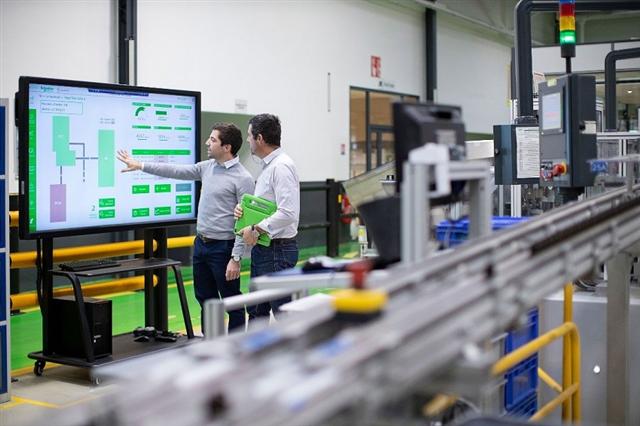
Schneider Electric's EcoStruxure architecture can provide a complete solution for smart factories
|
With Schneider Electric's experience, what are the challenges that food and beverage (F&B) enterprises need to address and what are the most optimal solutions?
Different businesses and industries have different challenges to deal with. With an enriching experience in the F&B industry, we recognised the issues that business owners need to prioritise currently, which include sustainability and energy efficiency by reducing their carbon and water footprints with improved processes, utilities, and better supply chain efficiency. They also need to provide operational excellence, which requires cutting out inefficiencies and helping teams manage growing process complexity while strengthening the link between sustainability and cost efficiency.
Additionally, there is a growing need to reduce the total cost of ownership by cutting CAPEX needs as they prolong the life of existing assets and reduce overall costs with streamlined operations and reduced energy waste. Furthermore, they need to make sure they deliver the brand promise by meeting customers’ rising demands for quality and sustainability with the right products at the right time.
Last but not least, they need to ensure food safety and provide access to consumer information. This will protect consumers and shareholder value with fewer risks linked to food safety and greater business transparency.
At the moment, Schneider Electric is providing a comprehensive set of solutions for F&B businesses including smart manufacturing, smart facilities, smart food safety, and smart supply chain.
| Info box: To learn more about Schneider Electric's comprehensive solution for F&B businesses, please visit: www.se.com/vn/en/work/campaign/local /go-industry.jsp |








